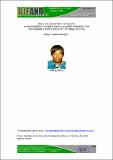Role of livestock projects in empowering women smallholder farmers for sustainable food security in rural Kenya
Publication Date
2009Metadata
Show full item recordAbstract/
Women are a major human resource and assure adequate nutrition, health and cognitive development of their households and children in their formative years. However, women are over-represented among the poor, suffer heavy workloads and have little control over resources for family care. Poverty and food insecurity are enhanced by lack of access to, and control over assets, and lack of access to institutions that provide opportunities and buffer from shocks and crises. The need to improve household food security and empower women in households has seen
the implementation of agricultural projects, particularly livestock projects that target women smallholder farmers. These projects are used as one of the major strategies to expand agricultural output in rural areas. Livestock contributes a higher share of income to rural households, improves food security and possibly enhances women’s participation in civic activities. Livestock development projects seek to empower women through increased household incomes, improve household incomes of women and nutritional status of women and other members of the households. This paper sought to establish a link between participation in livestock
projects, socio-economic status and nutritional status of index women. A crosssectional survey with a case-control model was conducted to establish the link between participation in a livestock project. Socio-economic and nutritional status of women from beneficiary and non-beneficiary households of livestock projects in Vihiga District, Kenya was assessed using both the Body Mass and the Brokas Index. A total of 300 beneficiary and non-beneficiary women were interviewed and their heights and weights measured during the study. Results revealed better incomes, education levels and nutritional status among the beneficiary women.
Development projects can attain their objectives when there is deliberate effort to ensure that the project goals are understood by all stakeholders, to create commitment to resource re-direction and embrace the purpose of the project. There has to be proper understanding of the familial and community cultures and practices if the course of women is to be addressed profitably, with full support of their husbands and the entire household for the success of the project.

